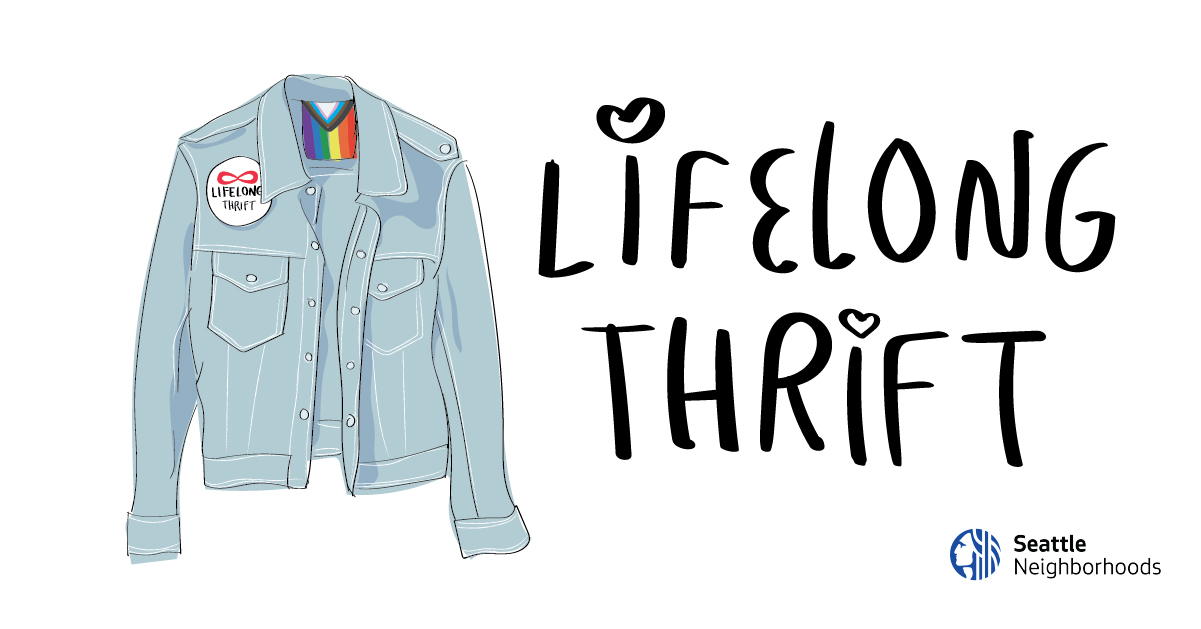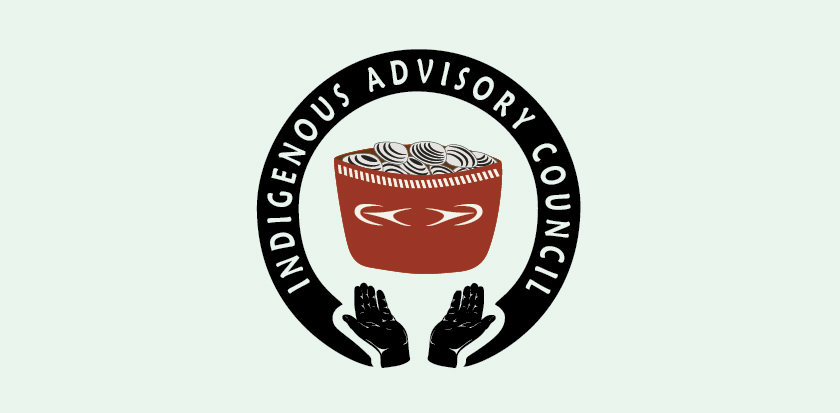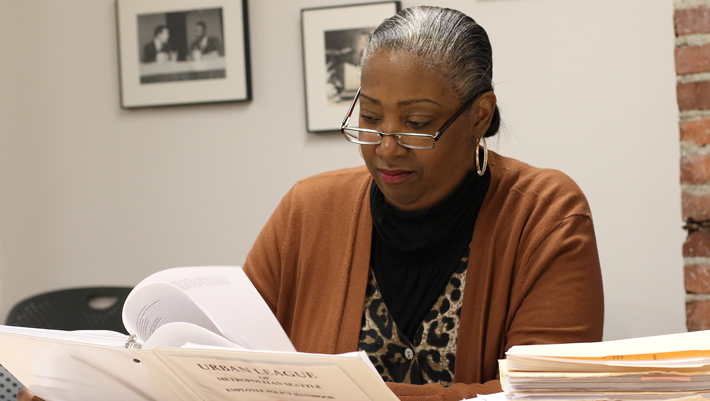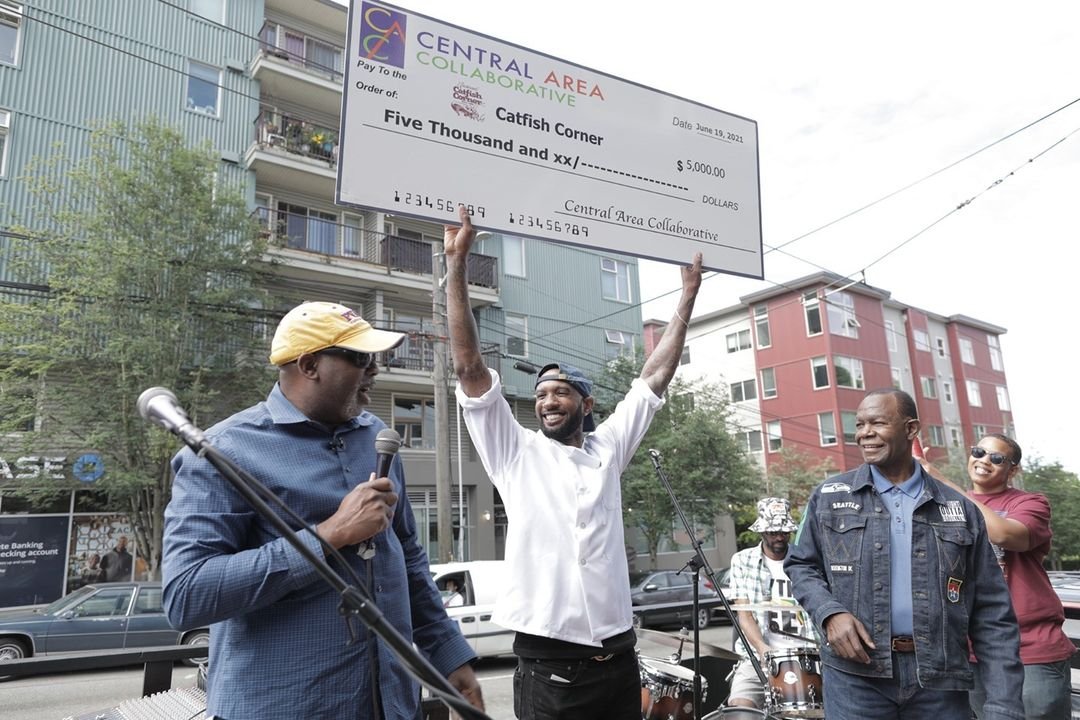
Historic preservation in Seattle begins with community. The Seattle Histories storytelling project highlights the places, people, and events that have shaped the history of Seattle’s communities. These stories, told by community members, emphasize experiences and narratives that may have been overlooked or misrepresented in our city. In honor of PRIDE month, we asked community members to submit stories specific to the history of Seattle’s LGBTQ+ community. Read the LGBTQ+ Seattle Histories stories and then delve into the full project.
Lifelong Thrift
By Angus Henderson
The text below is transcribed from audio interviews with members of the Lifelong Thrift community facilitated by store employee Angus Henderson.
Angus Henderson: My name is Angus Henderson, and for the last year I’ve been working at Lifelong Thrift Store. I wanted this job because I wanted to do something for the community that’s kept me alive since coming out 14 years ago. When I heard about the Seattle Department of Neighborhoods Project, I knew I had to get something together. In 1983, the Chicken Soup Brigade formed thrift stores to help feed people suffering from the HIV/AIDS epidemic, growing from a simple soup can passed around Volunteer Park into a substantial community nonprofit effort. In 2001, the name changed to be Lifelong Thrift Stores. While that began as several smaller storefronts, we now operate from a big, beautiful location at 312 Broadway East, right near the AIDS Memorial Pathway in Cal Anderson Park.
Every day, we invite community members inside to shop in an inclusive, presumption-free environment where the clothing is sorted by function rather than by gender. I have personally assisted several new trans people shopping for their first set of affirming clothing, which are experiences that I will treasure forever. Having a place to shop free of judgment is a pleasure that I only wish I’d had the opportunity to experience myself as a newly out trans person. It is an honor to help it happen for others.
We also help clinics in King County that support people living with HIV/AIDS who are in urgent need of clothing, household goods, or other essentials. This is the kind of place where a dollar can stretch pretty far, and whether the need is for clothing or for things to make their new apartment into a home, we are so happy to help. This kind of help and hope was born of adversity. The people that work, shop, and volunteer with us often remember what it was like during the worst of the AIDS crisis, when people died quickly and horribly without a shred of sympathy from their neighbors, much less their political representatives. That’s why I wanted to talk to my co-worker, Julia. Here’s what she had to say.
Julia
Angus: So I’m here with Julia, my co-worker, and my first question was when you moved to Seattle?
Julia: I first moved to Seattle in 1982, and I immediately moved to Capitol Hill ’cause it seemed like the coolest place in town. It was entirely… It’s old families, creatives, and queers. Most… All of them had been forced out because of prices now, but it was a pretty thriving place then. In the early ’80s, the AIDS crisis… Well, we didn’t know what to call it then, the HIV, there were just almost three-fourths of the men I knew had died from it. The party line was that women couldn’t get it, and, which was not true, and early on we lost in our community, out of that community, a couple of women from it.
Julia: The streets of Broadway were filled with very skeletal sick men with big purple lesions, and it was a horrible, horrible time. It really defined Capitol Hill. It defined a lot of stuff. At the time, there was… Or I’m not exactly sure when Lifelong Thrift opened, but it was originally on Union and 16th on the top of Capitol Hill. And I knew who was running it, and she was a friend, the manager, and we started donating things there or buying things there. I feel very full circle that I have been working for three years now at the newer location on Broadway. And I see people, survivors, older men especially, come in and still donate or shop and it’s a bittersweet feeling. I’m glad there are some around, but it was a very, very hard time. Nobody knew what was going on.
Julia: And there was this party line about women couldn’t get it. I knew two women who had died. So my now partner and another friend went to the Northwest AIDS Foundation, which just had started, and they put together a women’s group and they would go and teach safe sex or safer sex, use of condoms, use of what we called then, the love glove. People were starting to realize that they needed to be safer during sex, and that helped a lot of people then, a lot of information.
Angus: That’s wonderful. I mean, it’s a terrible story.
Julia: It’s a terrible story. Nobody knew, but it was going on for a long time. We lost so many men, and at the time there was no social media, but there was a printed paper, which still exists, called Seattle Gay News. And every Friday, people would go to wherever they carried it and get this three-part newspaper. Unfortunately, at that time, the biggest section was the obituaries. It was really hard. So many people lost, so many people to say goodbye to, so many people to try to help care for. It was a really, really hard time. I was grateful for Lifelong and several decades later, I’m really grateful to be working at Lifelong Thrift on Broadway, still on Capitol Hill. It’s a very important organization in a lot of different ways.
Brett
Angus: My next interview is with Brett, one of our wonderful Lifelong volunteers. So, this is Brett. You’re a volunteer at Lifelong.
Brett: That’s correct, yes.
Angus: But when did you first get to Seattle?
Brett: I moved to Seattle in 2004. I grew up over in Port Angeles and I came over to Seattle all the time as a kid for field trips and baseball games and whatnot, and then in high school for concerts and all sorts of teenage debauchery. And then went to school in Bellingham and moved to Seattle as soon as I graduated, and I’ve been here ever since.
Angus: Oh, came right to the big city.
Brett: Yes. Step stones.
Angus: The scary question is, what was your first experience with HIV AIDS?
Brett: It’s interesting. My first experience, it’s always been top of mind. It was being a kid in the ’80s there was a lot of fear and talk around it. And I was very careful when I came out and I started having sexual interactions with people. But a friend and I decided to be responsible, sexually active men, and we went and got tested. It was my first time getting tested, and I went just ’cause it was a responsible thing to do, and I tested negative, but my friend tested positive. And that led to obviously a deepening in our friendship and relationship, but a lot of eye-opening experiences is, I kind of stood by him as he went through the process of finding a doctor and everything else. He’s doing very, very well now. He’s a dad and living a happy life every day. I’m glad that it wasn’t a sad first experience. It was obviously scary, but I’ve learned a ton and I feel like I’m more responsible and knowledgeable because I’ve had a close friend that’s been dealing with it also.
Angus: Wow. Is that what led you into volunteering with us at Lifelong?
Brett: It’s definitely what led me to know what Lifelong was in the first place. And I was always aware of the organization and as soon as I moved to Seattle, it was one of the first places I started donating to because the soup kitchen had helped people that I knew. So I thought that that was, it’s a good place for me to put my money even though I didn’t have the time at the moment. And then I became a volunteer because a friend of mine was volunteering in the media department and needed some help because there was so much going on. And I started volunteering, I wanna say in 2017, I think is when I started. I’d have to go back and look. I may be lying, I apologize if I’m lying. But I’ve been for several years now, I’ve been volunteering on a weekly basis because it’s an important cause and it’s a lot of fun.
Tony
Angus: While it’s wonderful to hear from employees and volunteers, I didn’t want to miss out on the customer’s view. And for that, there’s nobody better than Tony. He’s been shopping at Lifelong since long before we landed on Broadway. So, Mr. Tony, what brought you to Seattle?
Tony: I came out to Seattle in 1967 after military and I’d been in Seattle during military and thought it was beautiful, so I came back.
Angus: I don’t believe you. So you’d been here for a while when the pandemic started to hit, the HIV AIDS one. What was your first experience with that?
Tony: Well, I didn’t come out until I was in my 30s, and my first experience with that, my first boyfriend actually had HIV and contracted AIDS and died from it. So there was a lot of experience of dealing with him and seeing him go through it and seeing friends in Seattle dying. And my friend was probably the first, he was actually the first person in this care facility that was out near Ballard. I think it was in Ballard, maybe a little past Ballard. And they didn’t know what to do with him. Didn’t, couldn’t figure it out, they… People were all plasticized from head to foot trying to care for him, put him on an isolated ward. And no one else was allowed to go because they didn’t know what he had, they didn’t, nobody knew what AIDS was at the time. This was in the beginning, this was very early on. That’s [chuckle] the beginning of my experience with all that.
Angus: Sounds like you had a lot of experience with it.
Tony: Well, it was pretty interesting, to first be coming out during that time and then seeing all that craziness and nobody knowing what it was and what to do with it, how to treat it, how to handle it. And everybody was, people were afraid to be near anyone with AIDS for fear that they might catch it. They didn’t know how you got it at that time.
Angus: Geez. What got you into Lifelong?
Tony: Lifelong. I got into Lifelong just because it was a thrift shop, a good thrift shop. I knew what they did or I found out soon after I stopped in. Someone there told me what they did, so I wanted to support it. And at the time, they were feeding people with AIDS and they had a shop on Jackson Street at 24th or 25th. That was the first that I saw that. And they had great clothes and cheap and I started going there and buying stuff that, it worked. It was great.
Angus: Real double whammy, huh. All goes to a good cause. You chased us all over too. You made it all the way up here to the Broadway location.
Tony: Well, Broadway is sort of home for me. I, for 10 years I had a shop across the street, back in the ’70s I guess. So I’ve always been around this neighborhood.
Angus: This really is the place to be.
Tony: Yeah, it’s a good place. And good clothes, good things, good home mirrors, everything. The art end, you can’t buy artwork better [laughter] any place in town in a thrift shop than you can at Lifelong.
Angus: That’s what I like to hear, ’cause I help do that part.
Tony: Yeah, that’s great.
Angus: In conclusion, Lifelong lives up to its name. This organization has no plans to stop doing what it’s doing because there’s always somebody out there in need of our help. I hope to live to see our 50th anniversary and the end of HIV/AIDS. I am Angus Anderson and we are Lifelong.



